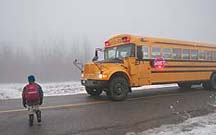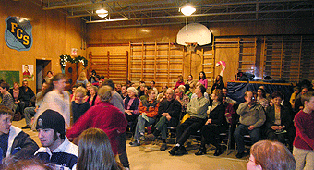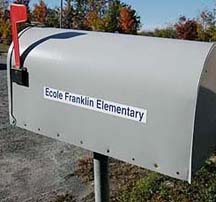Why are rural citizens in the Chateauguay Valley rallying to "Save Our Schools"?
Parents, teachers and citizens were stunned to learn last fall that the New Frontier School Board's Future Direction Committee recommended closing half of the Valley's rural elementary schools. The announcement tears at the heart of these communities, Franklin, Howick and Huntingdon, leaving them with little hope for future economic revitalization. The Board's FDC offered no alternatives, citing simply the need to cut expenditures.
But the Director-general stated that this is not so much about money as it is about pedagogy, which, he admitted, costs money.

Ken Robertson, Director-general
|
The small schools claim they are part of the solution, not part of the problem. They are not asking for improved pedagogy; in fact their split age classes and low student to teacher ratios are exactly what is being prescribed by the "New Reform". Still, they recognize the need to work with the Board to find ways of making their institutions economically sustainable.
As school administrators returned from a 3-day autumn retreat at an Eastern Townships resort, serious suggestions were made about another option that would cut expenditures at the administrative level.
The citizens cited erroneous figures in the Board's Future Directions Committee report that led to the school closing decision. Questionable maps and enrolment statistics and exaggerated maintenance cost data pointed to a seemingly obvious solution of closing these schools.
What angered the citizens in this geographically isolated part of Quebec is that the Board's process forced each struggling school to point accusing fingers at their sister schools in order to save themselves. A once region-wide community was at risk of being broken into individual towns each vying to avoid the Board's axe. Citizens claim they have been victims of a divide and conquer conspiracy.
School commissioners, however, deny any top-side strategic maneuvering, and at recent face-to-face meetings with the citizens, they assure their constituents that they are working with very capable peers.

With their rural schools closing, some children will be riding a school bus for 3 hours a day. Everyone agrees this is not healthy, physically or emotionally; few adults would accept such a daily commute. Already this is true for high school students in St. Bernard de Lacolle, Hinchinbrooke, Dundee and St. Timothee.
That fear of sending their small children on long bus rides to distant schools explains why parents from ordinarily polite little country schools are standing up in anger. A Franklin Township councilor told the governing board, "They want to take our children away from us, well, they can't have them."
Early in the process, the commissioners were prevented from speaking to their constituents. The D-g explained that the ban was to insure equity so that one school did not have more contact with the board than another. Despite the "gag order", one commisioner spoke at a Franklin School rally last spring and another was present at the special November 6 meeting in Howick. Another publicly contested the Board's ban measure at its regular November 7 meeting.
Also at play is the difference in values between the urban decision-makers and the rural residents. Chateauguay's shopping malls, commuter traffic and suburban housing developments is world's apart from the Valley's routine of 5 a.m. milking chores, cutting firewood in the bush, and plowing snow from a kilometer-long driveway.
From an urban point of view, the little school is quaint but not worth the added cost of small class sizes. But to those who live out there, the rural reality is all about community, neighbors helping neighbors, and the school is a social hub for this English minority population.

With few job opportunities, a constant exodus of youth, and the ongoing farm revenue crisis, towns like Franklin and Howick hang on with hopes that the economic revitalization that has swept through Mercier and St. Martine will eventually bring them some new life.
Howick is next in line for a housing boom just waiting for their sewer infrastructure to be built. But without a school, young families will settle elsewhere. This issue goes far beyond closing down schools; it's closing down towns.
In Huntingdon where hundreds of families were devastated last year with the closing of the textile mills, one of two English elementary schools could be on the Board's chopping block.
St. Joseph's School says they were unfairly represented in the Future Directions process and in the data book listing each school's facilities. Compared to the other schools,

|

there's was made out to look like they had very little, not even a library which they do have, thus an obvious target for closure, they claim.
Last winter the New Frontiers School Board invited each governing board to submit a proposal on how to make their schools more viable, use the space efficiently, and think outside the box in terms of coming up with creative solutions in the face of declining enrolment.
Despite full schedules of farming and parenting, Franklin's governing board and citizen volunteers held meetings, brainstormed solutions, analyzed costs, negotiated partnerships and wrote an impressive document that even the Board commended. They believed that each well-thought-out option would be looked at seriously and taken to the next level by their school board representatives.

In September, however, they were told simply that the little school in Franklin along with 2 others would be closed. The only choices offered: a) next year or b) the following year. One parent noted, "Two guys sitting at the bar could have come up with that solution."
Perhaps what is most frustrating is that many of the proposals from other Valley schools pointed to the closure of Franklin as the solution, based on the erroneous data provided them by the Board.
Some Franklin citizens suggested that they played directly into the hands of the Board which had long ago made up its mind about the decision and sought only the written proof that a "public consultation" had taken place.
But school commissioners say that no decision has yet been made and it will come down to a raising of hands at the Council of Commissioners' meeting on January 9, 2006.
Franklin parents point out that if their community school is closed, at least half of the students will be lost from the New Frontiers School Board as they move into the St. Antoine French school or home-schooling. The savings of $110,083 that it takes to run the school would be nullified by the loss of $5,500 per student funding that comes from the Quebec Education Ministry.

One idea to keep students near home is to begin serious discussions with the other small school in the municipality, Ecole Primaire St-Antoine. Perhaps the time is ripe for the two linguistic communities to join forces. This French school and the one in St. Chrysostome weathered their own round of closure threats a few years ago and still face that possibility due to declining enrolment. If both schools cannot be kept open then at least some sort of merger could keep all of the Franklin Township children in Franklin.
This idea is in line with the recent flurry of media attention given to Alex Patterson and a special advisory council to the Quebec English School Board Association. They promote a sharing of resources between French and English schools. There are already models in Quebec where either a building is shared or they have merged two separate schools into one.
Parents are willing to look at any other option than bussing their young children out of town. At the November 6 meeting, the Director-general dismissed any possibility of supporting a private or semi-private scenario but citizens in the targetted towns are also discussing that possibility.
The economic impact of school closures has come to light as other town leaders hear of the pending closures. In Howick the mayor has been present at every school board meeting and in Franklin one of North America's largest food processing plants has expressed genuine concern about the consequences. See Mike Leahy's letter in "Commentary".
The Franklin School is a glimmer of hope that our society can still be a hospitable place. Young children are cradled here in a caring community within a community, a human buffer against a speedy outside world.
Here each individual matters and each develops his/her unique abilities at their own pace. They are not in a modern school youth ghetto, rather they are exposed to people of all ages and from all walks of life who pass freely between school and community.
Yet they are not isolated from the real world. Parent carpools carry them to Ottawa, Montreal and Quebec City as well as on local field trips -- woodland snowshoe outings, apple picking and maple sugaring right across the street.
Citizens are heartened by a story recounted by old-timers who remember a visit to a nearby town hall by the late great educator Dr. Howard S. Billings. He was touting the benefits of consolidation, closing one-room schools and transporting students to local high schools, the beginnings of amalgamation.
An old farmer is said to have stood up and stated to Dr. H.S.B.'s delegation, "You can take your fancy suits and your fancy cars and your fancy ideas and go back to Quebec City." |